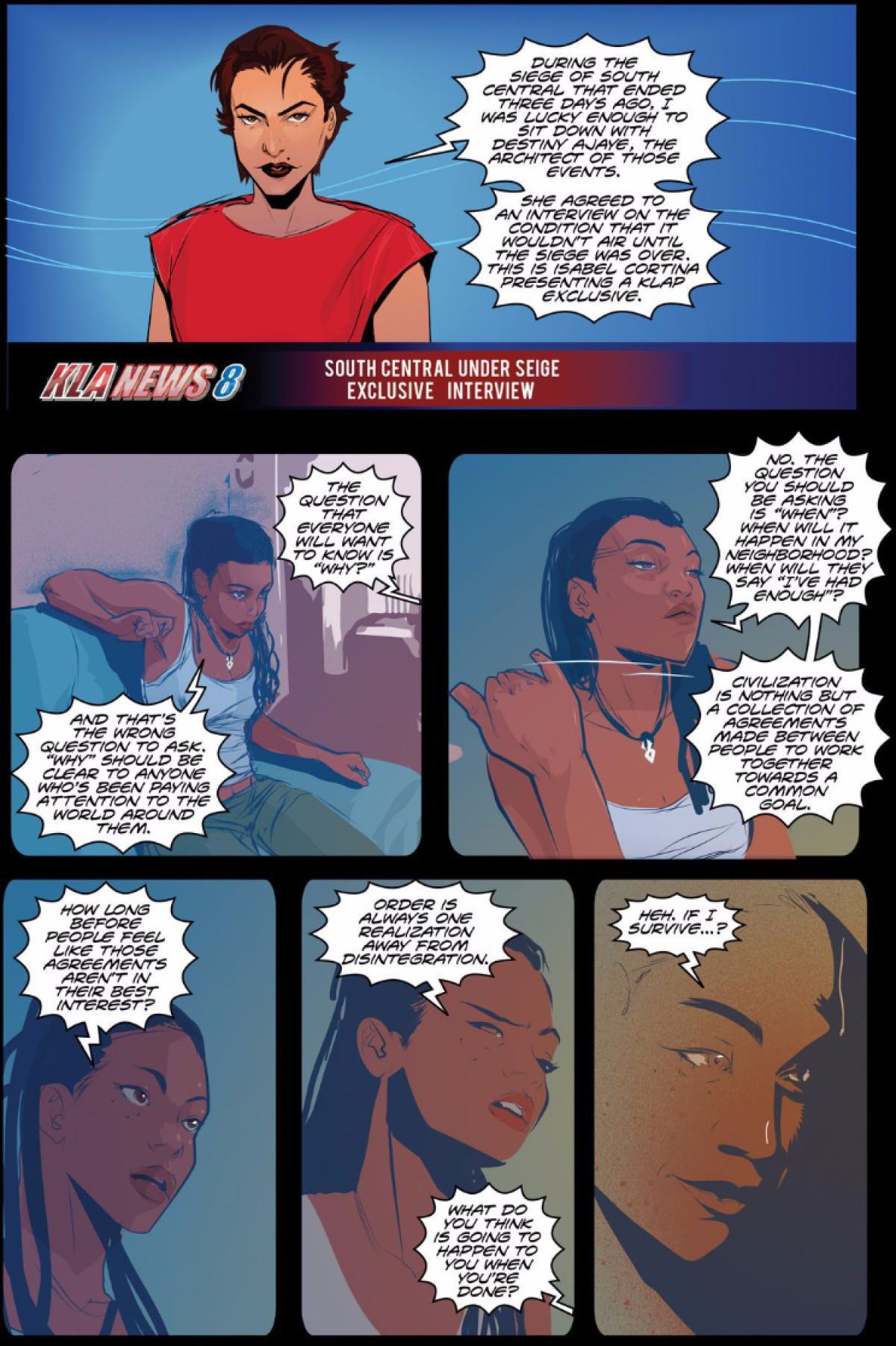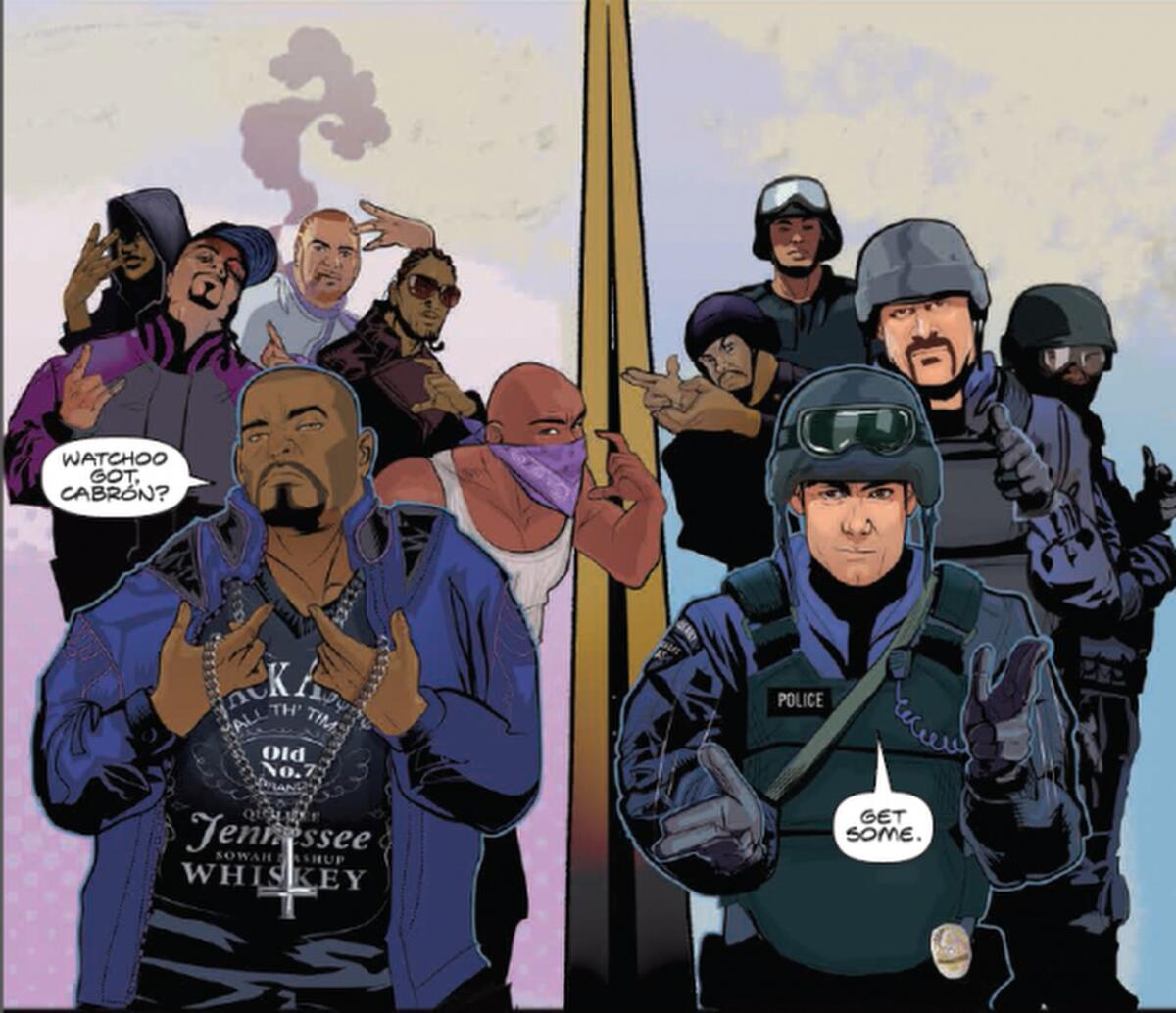Commentary: A comic book I wrote imagined snipers shooting at police. Now that frightening reality haunts me
- Share via
In 2008, the first issue of a comic book I co-wrote about a black teenager named Destiny hit the marketplace. “Genius” was about a war on the streets of Los Angeles that saw the city’s street gangs united against the authorities, the system, “the man.” It was meant to be incendiary.
The first pages show the opening salvo of that war: police officers being gunned down by snipers.
I have spent the better part of the last week like a pendulum, swinging between wanting to vomit and wanting to scream.
It has been a catastrophically difficult week in America. Many have written about the events surrounding the deaths of Alton Sterling and Philando Castile, and about the attack in Texas that left five police officers dead. Many have written about the renewed conversation around Black Lives Matter, as well as the renewed resistance to understanding what that phrase really means — that shining a light doesn’t equate to casting anyone else in darkness.
See the most-read stories in Entertainment this hour »
And many have written — or, in the case of Jesse Williams, testified on camera — about the particular mixture of rage, futility and sadness that too many black men in America feel.
I understand that seething, directionless anger.
I am black. I am a man. I am an American. I have never not known what that entails.
I realize that my life is one of privilege. I work at a major media outlet. I own a house in the suburbs and send my children to charter schools. I watch movies and write about them for a living. And when I’m not doing that, I write comic books. I enjoy a modicum of fame, thanks in part to doing a podcast with filmmaker Kevin Smith.
But I also realize that my privilege — more than that of my white friends, contemporaries and loved ones — is ephemeral, subject to revision and recantation without a moment’s notice.
The power of the American dream is that I can forget these realities, for a little while. But reality — marching at the quick tempo of some cruel metronome — seems hellbent on waking me up with an increasingly frightening regularity.
I keep hearing a line from that Langston Hughes poem called “Warning,” which begins: “Negroes, sweet and docile, meek, humble and kind. Beware the day they change their mind!”
My own anger first found voice in “Genius.” And with my co-writer, Adam Freeman, and artist Afua Richardson we decided to place that voice in the body of the young black heroine of “Genius,” Destiny Ajaye.
Like everyone she’d ever known, Destiny had been marginalized by the system and brutalized by the authorities. The difference was that Destiny was a military savant with a once-in-a-generation mind for strategy and tactics. So she turned a bunch of gangbangers into soldiers. She gave them an enemy on which to focus their rage. She declared war. On everyone.

Destiny knew that she was a villain. She knew that she was doing horrible things — and I like to think that we make that clear in the book. But Destiny also knew that fate chose her to be the spark that would light the powder keg that has been sitting under the United States for 400 years.
We as a country didn’t talk much about the indifference to black life when “Genius” No. 1 first dropped in 2008, but it was there. For generations, black parents have been teaching black children how to act around the police, lessons in non-confrontation learned the hardest way possible. We all knew there was such a thing as Driving While Black and Walking While Black and Shopping While Black. Living While Black.
It took six years for the entirety of “Genius” to be released. But by the time the final issue hit the stands in the summer of 2014, the rest of America came to know what we knew. After the death of Michael Brown as well as Eric Garner, Tamir Rice and so many others seen through the lens of the digital cameras we all keep in our pockets — everyone could see it.

When stories like “Genius” work, they provide a vicarious release in large part because we know the action is fictional. We thrill at movies like “Shaft” and “Foxy Brown” and “Django Unchained,” knowing that those protagonists are acting in ways we might fantasize about but would never in real life imitate.
Ironically, writers of fiction like this can feel safe knowing that the unthinkable will never come to pass, even while we posit a time and a place in which the unthinkable is inevitable.
With “Genius,” our intention was to provoke and upset. We wanted to look at the world we live in and push it to a place of crisis. We imagined a world on fire. But now, it seems, we’re living in a world on fire.
When Ferguson blew up, television screens across the country were filled with images that mirrored pages of our little funny book: tanks and soldiers rolling into black neighborhoods.
And now, snipers.
If this pervasive echo of familiar dread that I keep trying to blink away is anything like what it feels like to have the gift of prophecy… I don’t want it.
ALSO
The emotional hooks of 'Hamilton': Why the soundtrack makes me cry every single time
Marvel, 'Star Wars,' 'Harry Potter' and the age of the franchise: Why movie stars don’t matter
Prince gave black kids the license to be themselves, not what society thought they should be
Only good movies
Get the Indie Focus newsletter, Mark Olsen's weekly guide to the world of cinema.
You may occasionally receive promotional content from the Los Angeles Times.








